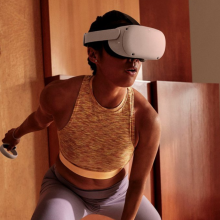UPDATE: Dec. 13, 2023, 1:43 p.m. EST Meta announced that it has rolled out smarter AI features, but as you'll find out in this review, I'm unable to test these new perks after making one grave mistake.
If you expect the Ray-Ban Meta Smart Glasses to deliver ChatGPT-level AI while feeding you glitzy visual information before your eyes, you'll be sorely disappointed.
However, if you accept 'em for what they are, glorious glasses that are an extension of your phone, giving you hands-free access to calls, photo and video capture, and a virtual assistant — as well as play, pause, and skip gestures for music tracks — you'll be satisfied.
Well, for the most part.
After spending several weeks testing the Ray-Ban Meta Smart Glasses, I was impressed in some ways, but frustrated in others.
Ray-Ban Meta Smart Glasses price
I purchased the Ray-Ban Meta Smart Glasses for $299 from Ray-Ban.com.

There are different lenses you can choose: shades or clear. There's even a "transitions" model, which is technically a blend of both, that adapts to your environment depending on the lighting. So on a sunny day, the lenses will darken. In dimmer environments, the spectacles have a clearer tint.
Which one did I get? The "Wayfarers" shades; think Tom Cruise in Risky Business. You can also get the "Headliners" variant, but that one is a little too "Spike Lee" for my tastes. I opted for the "Shiny Rebel Black" frames and the "Amber" lenses.

What I love about the Ray-Ban Smart Glasses
The Ray-Ban Meta Smart Glasses shocked me, in a good way, because it has such a slim and slick form factor, and yet, some of its capabilities exceeded my expectations.
Shockingly crisp sound
I wasn't expecting the music blasting from the Ray-Ban Meta Smart Glasses to sound this good. I fired up Spotify, and to my surprise, Harry Styles' "As It Was" sounded rich, full, smooth — and most importantly — immersive. It's as if Meta's engineers designed the open-ears speakers to emanate sound directly to my ears.

I own the Sony WH-1000XM4 headphones and the Apple AirPods Pro, but I'd swap 'em out for the Ray-Ban Meta Smart Glasses. My Sony headphones lack portability, and the AirPods Pro relentlessly fall out of my ears, but these spectacles are both compact and never fall off my face, rectifying the aforementioned irksome issues. Now, I wouldn't go as far as saying the Ray-Ban Smart Glasses sound better than those popular headphones, they just provide a better experience for me as a commuter.

Phone calls sounded crisp on the Ray-Ban Meta Smart Glasses, too. People on the other end told me I sounded loud and clear in quiet surroundings. However, unsurprisingly, while walking in noisy environments (e.g., sirens or whipping wind), I was told the opposite — I sounded "so-so" and somewhat tinny.
Slick controls
I can pause, play and skip songs by employing zippy touch gestures on the right temple's ultra-sensitive panel. For example, if I want to either pause or play a track, I can tap once. To skip, tap twice. After tapping three times, I can go back to a previous song.
Photos, videos conveniently zapped to your phone
Ray-Ban Meta Smart Glasses, packing an ultra-wide camera, support 12MP photos and 60-second, 1080p videos. And yes, once my 60 seconds are up, I can kick off a new recording — right where I left off. Once I'm ready to look at all of my captures, I open a companion app called "Meta View," which syncs every photo and video I've taken.

In this app, I can choose to save 'em to my photo library or share 'em with a friend. It's also worth noting that the Ray-Ban Meta Smart Glasses have a livestreaming feature for Facebook and Instagram, which I haven't tested because I'm no influencer, but it's ideal for content creators who want their followers to "see the world through their eyes." Livestreaming content is fed to viewers continuously (e.g., there is no time limit), however, it'll drain your battery fast.
Hands-free heaven
As someone who lives in New York, and often takes the subway, I often stumble upon bizarre scenes and strange characters. In those moments, I often have to rummage through my bag to find my phone, and by the time I take it out, the ship has already sailed, so to speak. However, with the Ray-Ban Meta Smart Glasses, I can quickly launch recording with a simple tap.

Accepting and receiving calls — without having to hold a damn thing — is another striking selling point of the Ray-Ban Meta Smart Glasses.
These spunky spectacles are helpful in moments when you want to record what you're doing, but your hands are preoccupied (e.g., you're cooking a meal). Case in point: A family member wanted to know how I made my beloved sweet potato pie. So with the Smart Glasses on my face, I showed her how I blended all the delicious ingredients into a bowl — all without needing a tripod.
Status updates when placed on your face
I love that my Ray-Ban Meta Smart Glasses "knows" when it's placed on my face, because every time I put them on, a voice (i.e., Meta AI) delivers a battery status update, which is useful.
What's 'eh' about the Ray-Ban Meta Smart Glasses.
There are some apsects about the Ray-Ban Meta Smart Glasses that I don't love, but I can't say I hate 'em either; I'm simply indifferent.
Photos, videos are decent — in the right lighting
In well-lit environments, the pictures and videos I've taken with Meta's spectacles look alright. No, they're not better than what my iPhone 15 Pro Max can accomplish. And of course, outperforming an iDevice isn't Meta's goal. However, the photos and recordings from the spectacles are more than satisfactory. It's worth noting, though, that the quality of photos diminish in low-light environments, like a dim restaurant, for example.
See the Ray-Ban Meta Smart Glasses' capture of an ornament hanging on a Christmas tree inside Bryant Park — and compare it to the iPhone 15 Pro Max's wide-lens shot. Keep in mind that I cropped the Smart Glasses' photos to match the Pro Max's landscape orientation. (The Ray-Ban Meta Smart Glasses produces Portrait-Mode photos.)

I wish I chose a different style
I regret not purchasing the "Transitions" design. Why? As much as I love shades, they're not socially acceptable to wear at night nor indoors.

As such, I felt strange wearing them at 9 p.m. at night, no sunray in sight, even though they're technically my headphones replacement and I use 'em to listen to music. I know I shouldn't care what people think, but I couldn't shake the feeling that I was perceived as the "nighttime shades-wearing weirdo."
Audio leakage
Yes, people will be able to hear music, podcasts, and the conversations you're having.
The only way to avoid this is to keep the volume below the 30% level. But even then, passers-by will still hear some sound, although it will sound muffled and unintelligible.
Battery life is OK
In my experience, the Ray-Ban Meta Smart Glasses can last about a day on a single charge. When I tested them, I started off at 100 percent at 9:51 a.m. on a Tuesday. I played music, took photos and videos, and took a 15-minute call. During meetings and while I was working, it remained idle. By 2:49 p.m., the battery dropped to 43 percent.
At around 3 p.m., I took another 15-minute call. During my hour-and-a-half commute to work, I played more music. By the time I got home, which was about 7:30 p.m., the battery dropped to 16 percent.
Fortunately, you can squeeze out more juice out of the Ray-Ban Meta Smart Glasses with the charging case.
What I dislike about Ray-Ban Meta Smart Glasses
I don't love the placement of the capture button
The capture button, positioned on the left arm, lets you take photos (one tap) and videos (press and hold before letting go).

However, it's placed in a position where I naturally want to grip the spectacles to readjust them on my face. Consequently, I often found myself unintentionally taking errant pictures.
Meta AI is underdeveloped — for now
Meta AI is still in its nascent stages — and it shows. On one hand, it works like a charm when it comes to taking commands. For example, I love how I can say, "Hey Meta, Call Mom from WhatsApp," and within seconds, the phone is ringing to connect me with her. On the other hand, its AI capabilities aren't ChatGPT-level yet.

I actually have tested a ChatGPT-enabled pair of smart glasses. They're called Solos AirGo 3, and their ability to answer questions, and even tackle real-time transcription and language translations, are spectacular. As such, you can understand why I'm slightly underwhelmed by Meta AI. Sure, the chatbot can answer trivia-like questions with ease, like "How tall is the Eiffel Tower?", "How many countries are there in the continent of Africa?" and "How do I make key lime pie?"
However, it struggles to respond to simple queries that typically doesn't stump modern AI, including, "Give me an easy skincare routine to follow at night" and "Tell me the weather in my area." With the former, Meta AI told me it doesn't answer skincare questions, and for the latter, it lacked access to real-time data.
For the time being, Meta AI is a glorified Siri, but it may mature into a sophisticated tool soon. For example, Meta promises that, in a future update, Meta AI will be able to give you details about visual information it "sees" (e.g., a translation of a foreign sign or historical tidbits about a foreign structure). Only time will tell if Meta AI will eventually measure up to our expectations.
Don't lose the charging case — or you're screwed
The charging case is definitely an upgrade from its predecessor's (Ray-Ban Stories) bulky variant. Sticking your glasses in them can extend their battery life, too.

However, please, for the love of all things holy, do not lose them. I lost mine, and as it turns out, Meta and Ray-Ban do not sell the charging case independently on their official websites.

I even tried to tap into my warranty, which appeared to allow users to purchase one for $70, but unfortunately, the charging case was "unavailable." I reached out to Meta's customer service for help, but did not receive a reply.
Unfortunately, my Meta Ray-Ban Smart Glasses are now pretty much useless because I don't have a charging case to juice them up.
Final thoughts
The Meta Ray-Ban Smart Glasses need to be in your life if the following selling points appeal to you:
Hands-free captures, particularly video recording and livestreaming
Hands-free calls with the help of Meta AI
Crisp calls, music, and podcasts
Decent photo and video quality, particularly in well-lit environments
Super responsive touch gestures for pausing, playing and skipping
Attractive, lightweight design
However, if you're expecting sophisticated AI — à la ChatGPT or Gemini — the Ray-Ban Smart Glasses aren't there yet.
As mentioned, Meta did promise that a more advanced version of Meta AI will roll out next year. When it does, I'll be sure to update you, dear reader, on whether it has graduated into a more useful chatbot.
Topics Meta





















